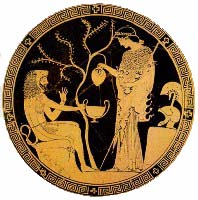 The olive tree has a very special place in Greek Mythology. The most important is the gift of the goddess Athena, the olive tree, the representative of fertility and peace. According to legend in Greek mythology, the king of gods Zeus organizes a contest for the city of Attica. According to the contest, it will be the city's guardian, who will give the city of Attica the most precious gift. Zeus's daughter goddess Athena and sea god Poseydon participate in the race. In the competition, Poseydon, the god of the seas first, gets a glorious horse from the sea. This horse will be able to bear very heavy loads and it will be very useful in wars.
The olive tree has a very special place in Greek Mythology. The most important is the gift of the goddess Athena, the olive tree, the representative of fertility and peace. According to legend in Greek mythology, the king of gods Zeus organizes a contest for the city of Attica. According to the contest, it will be the city's guardian, who will give the city of Attica the most precious gift. Zeus's daughter goddess Athena and sea god Poseydon participate in the race. In the competition, Poseydon, the god of the seas first, gets a glorious horse from the sea. This horse will be able to bear very heavy loads and it will be very useful in wars.
Athena takes an olive tree from the earth and wins the contest, which becomes the protector goddess of Attica, and is called the city. According to mythology, the goddess Athena presented the olive tree to the Athenians for symbolizing peace and civilization. This choice is not just to choose the olive tree instead of the "horse" ... At this same time, the people have chosen peace instead of nomadism, peace and civilization instead of war and plunder. The most prominent symbol of Athena, the goddess of spiritual brightness, which represents intelligence, intelligence and art, is the olive tree, the tree of its own creation.
According to another legend, this tree, which was specially protected by the warriors, is burnt with the Acropolis in Persian occupation in 480 BC. After the occupation the olive tree among the ruins of the acropolis sprouts, revives and its exiles are sown all over Greece. It is said that all the olive trees that have been created for this reason have grown from this first olive tree created by Athena.
Being born under the olive tree was, according to the Ancient Greeks, the most important sign of being from a sacred family. B.C. In the epic of the Iliad, where Homeros thought to have lived in the 8th century, the olive tree and olive oil were richly depicted and likened to the likeness of olive oil.